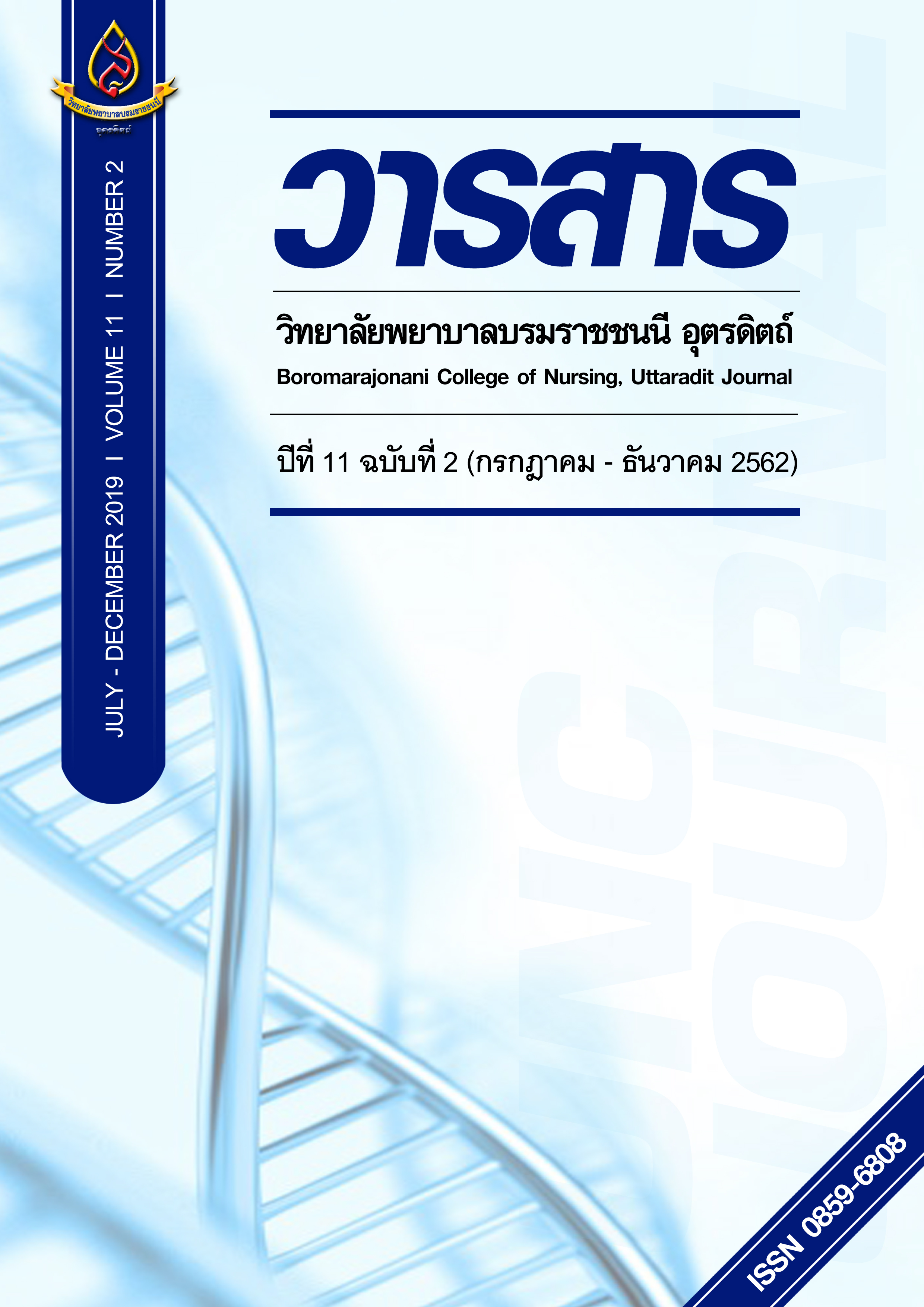ภาวะสุขภาพจิตและผลสัมฤทธิ์ทางการเรียนของนักศึกษาพยาบาล
Main Article Content
บทคัดย่อ
บทความนี้ มีวัตถุประสงค์เพื่อแสดงให้เห็นว่า ภาวะสุขภาพจิต และผลสัมฤทธิ์ทางการเรียนเป็นสิ่งสำคัญสำหรับนักศึกษาพยาบาล ทั้งนี้คณะพยาบาลศาสตร์ มหาวิทยาลัยสวนดุสิตเห็นว่าการเรียนการสอนวิชาการพยาบาลมุ่งเน้นให้นักศึกษาพยาบาลมีความรับผิดชอบสูง มีความละเอียดรอบรอบ มีภาวะผู้นำ เผชิญปัญหา และจัดการได้อย่างเหมาะสม ทำงานร่วมกับผู้อื่นได้อย่างมีประสิทธิภาพ อันอาจจะนำมาสู่ความเครียด วิตกกังวลหรืออาจพัฒนาขึ้นเป็นภาวะซึมเศร้าได้ ดังนั้นจึงได้นำแบบวัดสุขภาพจิตของคนไทย (Thai Mental Health Questionnaire) มาใช้กับนักศึกษาทุกชั้นปีรวมทั้งวิเคราะห์ความสัมพันธ์ระหว่างภาวะสุขภาพจิตกับผลสัมฤทธิ์ทางการเรียนเพื่อนำผลการประเมินมาวางแผนการดูแลนักศึกษาให้เหมาะสมต่อไป
ผลการประเมินพบว่าในภาพรวม ภาวะสุขภาพจิตของนักศึกษาทั้ง 4 ชั้นปี อยู่ในเกณฑ์ปกติ ยกเว้น ในชั้นปีที่ 1 ภาวะสุขภาพจิตกลุ่มอาการการมีสัมพันธภาพกับบุคคลอื่นและในชั้นปีที่ 2 ภาวะสุขภาพจิตกลุ่มภาวะอารมณ์เศร้า มีคะแนนต่ำกว่าเกณฑ์ปกติเล็กน้อย ผลสัมฤทธิ์ทางการเรียนของนักศึกษาโดยรวมอยู่ในระดับดีถึงดีมาก ภาวะสุขภาพจิตและผลสัมฤทธิ์ทางการเรียนมีความสัมพันธ์เชิงบวกต่อกันยกเว้นในชั้นปีที่ 4 พบว่า ภาวะอารมณ์เศร้าเป็นการเสริมแรงเชิงลบกับผลสัมฤทธิ์ทางการเรียน ด้วยเหตุนี้ คณะพยาบาลศาสตร์ มหาวิทยาลัยสวนดุสิตได้กำหนดรูปแบบการดูแลนักศึกษาทั้ง 4 ชั้นปี ไว้ดังนี้ 1) การจัดสิ่งแวดล้อม 2) การดูแลแบบเครือข่ายอาจารย์ 3) การดูแลโดยเพื่อน (Student – Peer Assisted) 4) การขยายช่องทางติดต่อสื่อสาร 5) การจัดกิจกรรมเพิ่มพูนสมรรถนะ ทั้งนี้ การติดตามเฝ้าระวังการเปลี่ยนแปลงภาวะสุขภาพจิต ตั้งแต่การค้นหานักศึกษาที่อาจมีภาวะเสี่ยง จนถึงการจัดระบบการดูแลเพื่อให้นักศึกษาบรรลุผลสัมฤทธิ์ที่พึงประสงค์เป็นความรับผิดชอบที่สำคัญยิ่งของสถาบันการศึกษาพยาบาล
Article Details
บทความหรือข้อคิดเห็นใดใดที่ปรากฏในวารสารวิจัยการพยาบาลและวิทยาศาสตร์สุขภาพ เป็นวรรณกรรมของผู้เขียน ซึ่งบรรณาธิการหรือสมาคมศิษย์เก่า ไม่จำเป็นต้องเห็นด้วย และบทความที่ได้รับการตีพิมพ์เผยแพร่ถือเป็นลิขสิทธิ์ของวารสารวิจัยการพยาบาลและวิทยาศาสตร์สุขภาพ
เอกสารอ้างอิง
2) Bloom, B. S. (1976). Handbook on formative and summative evaluation of student learning. New York: McGraw-Hill.
3) Chailunga, S. (2014). Emotional stability and adversity quotient among student at Boromarajonani College of Nursing, Phayao. Nursing Public Health and Education Journal, 15(2), 30-39. (in Thai)
4) Department of Mental Health. (2015). Document for the 14th international mental health conference and the 12th mental and psychiatric symposium, Bangkok. Retrieved (2019, September 20) from https://www.aimhc.dmh.go.th/
5) Department of Mental Health. (2018). National mental health development plan No. 1 (2018 - 2037). Retrieved (2019, September 20) from https://www.aimhc.dmh.go.th/
6) Dupuy, H. J. (1977). The general well-being schedule. In F. McDowell & C. Newell (Ed), Measuring health: A guide to rating scales and questionnaires: New York: Oxford University Press.
7) Good, C. V. (1973). Dictionary of education (3rd). New York: McGraw-Hill.
8) Klaharn, R. (2014). The factors affecting the practicum achievement of the Third–Year Nursing Students of Srinakharinwirot University. Journal of The Royal Thai Army Nurses, 15(3), 412-420. (in Thai).
9) Kongchuay, K. (2014). The causal relationship model of factors influencing achievement of students, faculty of education, rajabhat universities in southern regional area. Rajabhat Universities in Southern Regional Area: Faculty of Education.
10) Kraithaworn, P. & Kittipimpanon, K., (2014). The relationship among sense of university belonging, happiness in learning, learning-facilitating environment, and academic achievement among undergraduate nursing science students. Ramathibodi Nursing Journal, 20(3), 415-429. (in Thai)
11) Pau, P., et al. (2015). The relationship between mental health and academic achievement among university students – a literature review. GlobalIlluminators Publishing, 2, 755-764.
12) Peterson, T. (2018). What are the components of mental wellbeing?, HealthyPlace. Retrieved (2019, October 22) from https://www.healthyplace.com
13) Phattharayuttawat, S. et. al. (1999). The Thai mental health questionnaire. Siriraj Medical Journal, 51(1), 46-52. (in Thai)
14) Pitt, V. et al. (2012). Factors influencing nursing students' academic and clinical performance and attrition: An integrative literature review. Nurse education today School of Nursing and Midwifery, University of Newcastle, Australia.
15) Pukahuta, P. (2015). The factors that influenced academic achievement of students case study: Rajamangala University of Technology Isan. KKU International Journal of Humanities and Social Sciences, 5(3), 53-68.
16) Reangsing, C. & Wongsuraprakit, S. (2014). Mental health Factors to the learning behaviors among first year students at Mae Fah Luang University. Nursing Journal, 41(1), 122-133. (in Thai)
17) Ryff, C. D. (1995). Psychological well-being in adult life. Current Directions in Psychological Science, 4, 99-104.
18) Sihawong, S., et al. (2018). Factors causing to stress of nursing students, Ubon Ratchathani University. HCU Journal of Health Science, 21(42), 93-106 (in Thai)
19) Spence, J.T. & Helmritch, R.L. (1983). Achievement related motives and behaviors. achievement and achievement movies, Sanfrancisco: W.H. Freeman.
20) Tongsawang, K. (2017). The relationships between the Personal factors, stress, emotional intelligence and academic achievement of the students at Faculty of Nursing, Chaiyaphum Rajabhat University. Journal of The Royal Thai Army Nurses, 18(2), 91-100. (in Thai)
21) Videbeck, L., S., (2018). Mental Health Nursing 7 th ed. China: Wolters Kluwer.
22) Weingchai, P., (2015). Physiological response to stress. The Institute for The Promotion of Teaching Science and Technology. Retrived (2019, September 20) from https://biology.ipst.ac.th.
23) World Health Organization. (2011). Mental health atlas 2011. Geneva: World Health Organization.


